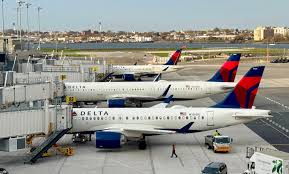Airport Parking and Hotels, a leading UK airport parking specialist, has released a new report exploring how major international airlines are increasingly going paperless in their operations.
The report focuses on key players in the industry — Emirates, British Airways, easyJet, and Japan Airlines — and how these carriers are using technology to improve passenger experience and cut down on paper usage.
According to the report, many airlines are now using digital boarding passes, mobile apps, and other technology to streamline their operations and make journeys smoother for travellers.
In March, Ryanair announced that from November 3, 2025, it will no longer allow passengers to download or print physical boarding passes. Ryanair will become the first airline — as far as we know — to implement a fully paperless boarding process.
Ryanair’s Chief Marketing Officer, Dara Brady, explained, “Ryanair is Europe’s number one airline for choice, low fares, and service. The move to 100 per cent paperless boarding from November 2025 will help us streamline the travel experience for passengers. It will be especially helpful during disruptions, as we can send real-time updates directly to smartphones, offering alternative flight options, transfers, or hotel accommodations when necessary.”
With smartphones, digital boarding passes, self-service bag drops, and Artificial Intelligence (AI)-powered apps, air travel is rapidly going digital.
However, the report highlights that not all carriers are ready to say goodbye to paper. Emirates, Virgin Atlantic, and Singapore Airlines, for example, continue to give their passengers the option of online check-in alongside physical boarding passes at the airport.
Meanwhile, Jet2 and easyJet promote their apps for boarding but still allow travellers who prefer to use printed boarding passes to do so.
When it comes to check-in options, all the surveyed carriers support online check-in, and most have implemented self-service bag drop stations.
Digital passport integration, however, is lagging. The report explained that this is not due to a lack of technology from the carriers, but instead because of government regulations that slow its rollout.
Some airlines are already exploring Artificial Intelligence to help make journeys more convenient. Qatar Airways, for example, launched Sama in 2024 — a holographic AI avatar designed to help travellers navigate their journeys. Singapore Airlines has also implemented an AI-powered assistant on its website to aid customers in booking and managing their travel.
Nick Caunter, Managing Director of Airport Parking and Hotels, explained that while digital tools can be helpful in improving the passenger experience, a 100 per cent paperless approach might exclude some people — particularly those who lack smartphones, reliable internet, or are not comfortable with technology.
Caunter said, “Digital tools are a very helpful part of the modern air travel experience, but 100 per cent paperless risks leaving some people behind. For those who do not fully trust smartphones or prefer to travel with paper documents, this guide will help them select the airline that suits their needs.”
